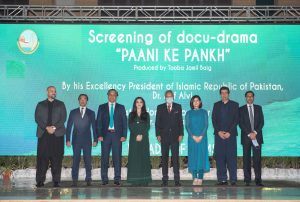KARACHI: Tooba Jamil Baig is a director at JB Group and a film producer at JB Films. She is currently doing her Masters in Enterprise Risk Management at Columbia University, New York. According to her, being involved in the day-to-day operations of her family-owned multiplex chain, Nueplex Cinemas, has helped her develop a strong understanding of film exhibition and distribution early on.
However, it was only about two years ago when Tooba discovered her growing interest in film production. When the pandemic began in early 2020, her inner love for academia led her to the New York Film Academy website, where within a few minutes she shortlisted multiple programmes for herself. As she completed the certifications, she not only realised her hidden passion for films, but was also able to identify key elements that were lacking in the Pakistani film industry.
In an exclusive interview with The Upcut, Tooba talked about many things including how she took the leap and went on to produce her first documentary.
Did you always want to work in the Pakistani entertainment industry?
Tooba Jamil Baig: No, my focus had always been more towards entrepreneurship, business development and also international politics. Even at Nueplex, I was purely focussing on revenue generation, operations, and business expansion. I always viewed it as one of the businesses of JB Group, and thus the only contribution I made was entrepreneurial.
However, over time as I analysed the shifts in footfall at Nueplex, I understood how desperately our industry needed good content, and that too on a regular basis. In the entertainment industry, everything is interrelated. Be it cinemas, distribution and film production. So, in order to make one pillar thrive, it needs to be ensured that entire industry is prospering and growing in a collaborative manner.

You have produced a critically acclaimed docu-drama “Paani Ke Pankh” at such a young age. What inspired you to take up such a subject in the first place?
TJB: “Paani Ke Pankh” addresses issues that are all very close to my heart. It sheds light upon water scarcity in Pakistan, and stresses upon the importance of cleaner and greener energy. Furthermore, it showcases Pakistan’s phenomenal journey from “War to Water”, which is no less than a miracle.
When I read about Water & Power Development Authority (Wapda) projects and the ongoing construction of Mohmand Dam in Swat, I ended up researching the history of Mohmand. I discovered that this inexplicable shift from water to prosperity took place in just four to five years, yet not many people know about it.
Thus, I can say that it was the motivation to communicate this success story that acted as my main source of inspiration.

Do you plan on working on more such subjects in future?
TJB: Definitely. There are various Pakistani stories that need to be taken to the map. I wish to explore the themes of women empowerment, economic development and also Pakistani sports. And I believe there is no stronger medium than film. Thus, I hope to communicate my research and findings through my documentaries.

Tell us a bit about your new project “Ghabrana Nahi Hai”.
TJB: “Ghabrana Nahi Hai” is a production of JB Films, and it is all set to release on Eid ul Fitr next year. The film embodies the core principles of our production house, as it supports and launches new talent in the industry. It will mark Saqib Khan’s film directorial debut.
Furthermore, it will also introduce actors Zahid Ahmed and Syed Jibran in the world of films. Saba Qamar will be playing the role of the protagonist, as the movie’s main focus is women empowerment. I can confidently say that “Ghabrana Nahi Hai” will bring something new to the Pakistani audiences. It is a pure family-oriented, entertainment-packed project, with a very positive social message.

Do you believe that screening of Indian movies should be allowed in Pakistani cinemas?
TJB: It is not necessarily about Indian movies. I believe that international films in general are extremely important and should be available. One can make a rather cliched statement and say “art has no borders”. But one must dig deeper.
Over the past few years, with the multiplex business, I have witnessed the impact competition has on Pakistani filmmakers. In order for us to grow, we need that sort of international competition. A benchmark needs to be set, only then will Pakistan be able to create content that can be taken to the global stage.
There needs to be an atmosphere where there is learning and unlearning, a competition for peak show times, and more importantly, a desire to create state-of-the-art content.
If you ever got the opportunity to work with producers and filmmakers across the border, would you do it?
TJB: There should never be any restrictions for anyone who wants to learn and flourish. Meeting filmmakers from across the world and working with them will only give us immense knowledge, experience and exposure. One cannot deny the fact that our neighbouring country nestles the world’s second largest film industry.
We must acknowledge their success and understand that the three long decades where our industry was shutdown, our neighbours excelled to the greatest heights of film production. This fact instills in me the enthusiasm to prioritise the untapped talent of Pakistan, and focus purely on working with people and entities within our borders first.

Do you think that Pakistani cinema needs better scripts if it is to survive let alone thrive?
TJB: Yes. I will always define screenplay and scripts as the backbone of a film. We don’t only need good scripts, what we also need is screenplay writers. There is a big difference between simply writing and screenplay writing. We need writing which is customised for a theatrical motion picture; where less is verbally informed, and more is visually and acoustically expressed.
What are some of the challenges that Pakistani producers and filmmakers face while working on projects? And how can they be overcome?
TJB: The main challenges Pakistani producers are facing are limited resources and talent. We have been producing movies back-to-back since our revival in 2013, yet in the past eight years, we have only seen two to three core directors, a handful of actors, and the same production houses.
We need to make a conscious effort to break this cycle and introduce crisp writers, fresh faces and new directors. There are thousands of young aspiring actors, cinematographers and screenplay writers who have dedicated years to academically master the art of filmmaking. Now it is up top us to give them the professional platform to take not only their talent, but the entire Pakistani industry further.
What’s next for Tooba Jamil Baig?
TJB: At the moment, my prime focus is my Master’s degree. However, I take Sunday mornings to unwind and develop conceptual frameworks for potential projects. I have two to three very strong ideas in mind, through which I am also exploring my fondness for screenplay writing. Let’s see what I come up with.









